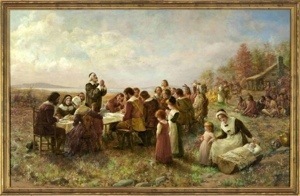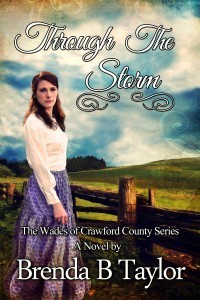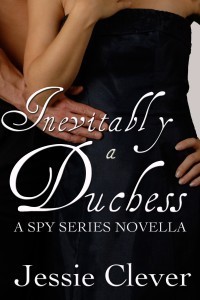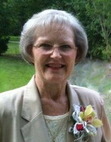Brenda B. Taylor's Blog, page 27
December 6, 2013
Love Gone to the Dogs
By Margaret Daley
Love Gone to the Dogs is a sweet romantic comedy by award winning author, Margaret Daley. Margaret will give away an ebook copy from Amazon of Love Gone to the Dogs to a lucky commenter.

Margaret Daley
Margaret Daley, an award-winning author of eighty-six books, has been married for over forty years and is a firm believer in romance and love. When she isn’t traveling, she’s writing love stories, often with a suspense thread and corralling her three cats that think they rule her household. To find out more about Margaret visit her website at http://www.margaretdaley.com.
Facebook: https://www.facebook.com/margaretdaleybooks
Twitter: https://twitter.com/margaretdaley

Love Gone to the Dogs by Margaret Daley (book one in Second Chances Series):
Single mom, Leah Taylor, has her hands full with a grandfather, an inventor, who lives a bit risky when it comes to his job and two sons, one a rambunctious genius. But it is her free spirited beagle who gets her into trouble with her new neighbor, Dr. Shane O’Grady, when her dog makes a move on his champion bichon that he wants to breed.
Leah and Shane clash over their dogs that clearly like each other. Leah is determined to ignore her neighbor, but when her youngest son who tries to defy gravity and fly ends up hurt, it is her neighbor, the doctor, who takes care of her son. Can Leah and Shane find love or has love gone to the dogs?
Buy Love Gone to the Dogs at Amazon
Excerpt from Love Gone to the Dogs:
When Leah Taylor heard the pounding on her front door at seven o’clock in the morning, she jumped, nearly sloshing her coffee all over her hand. Did burglars now announce themselves before stealing a person blind? No one else in his right mind would be out visiting at this time. Carefully, so as not to spill the hot brew, she placed the mug on the kitchen counter and made her way toward the insistent pounding that she was sure was waking up the whole neighborhood.
She peered out a narrow slit in her mini blind and saw an enraged, huge man standing on her front porch with a shredded newspaper in one hand. The other was clenched at his side. He wore practically nothing except a pair of jean shorts. He stepped back and glanced around, clearly not happy that no one had answered his summons.
Backing away from the window next to her door, Leah nervously chewed the end of one of her acrylic nails. The man looked familiar. She was sure she had seen him in the yard across the street. He had to be a neighbor. But why was he welcoming her to the neighborhood at such an early hour, and with an angry expression on his face? She had been here only a few days, and her family hadn’t done anything yet to upset the delicate balance of this small town. Or had they? She thought back over the past few days of almost nonstop unpacking. She had been too tired to even venture from the house much, and the same went for the rest of her family—she hoped.
When the pounding started again, she was so surprised by the sound that she bit through the end of her new acrylic nail. Well, now he was making her mad. Without thinking, she yanked open the front door and prepared to confront the man who had the nerve to pay her a call at seven o’clock in the morning.
“Look what you made me do!” Leah held up her hand. “I’ve tried everything to grow my own nails long, and nothing’s worked. I finally decide to get fake ones—that I might, by the way, tell you cost me forty dollars—and look what your pounding has done. They haven’t even lasted one week.” She blew out a deep breath, then brushed her bangs away from her face in frustration.
His dark eyes widened, and his mouth dropped open. He started to say something, but decided instead to allow his gaze to trek downward slowly—way too slowly for Leah’s peace of mind. A blush leaped into her cheeks as she remembered her skimpy attire. She controlled the strong urge to try to stretch her large, white T-shirt until it covered more than the tops of her thighs. When his survey stopped at her bare feet, her toes wiggled as if they had a will of their own.
She felt practically naked under his intense look. While he was staring at her, she began at his bare feet, which were braced apart in a stance that conveyed his anger, not one toe wiggling. Her gaze traveled upward over long legs that probably belonged to a runner, to narrow hips that the jean material hugged nicely. She paused ever so slightly at the washboard ripples in his flat stomach and came to the decision that the man worked out religiously, something she religiously tried to avoid. Her impression of his being an exercise freak was confirmed when her gaze skimmed over a broad chest, wide shoulders, and arms with taut muscles bulging as he held them rigid at his sides. Bod of steel, she thought, realizing her impulsive inspection had done nothing to cool the heat in her cheeks.
That realization was utmost in her mind until her gaze came to rest on his face—not poster boy handsome, but rugged and very masculine. Then she noticed his eyes, dark as chocolate, growing rounder as he took in her features. Oh, no! All traces of the heat from her blush left her cheeks. Why hadn’t she remembered that she had forgotten to remove yesterday’s makeup, when she had fallen exhausted into bed, and that her short hair lay at odd angles all over her head as it did every morning? Realizing she looked like Rocky the Raccoon having a bad hair day, Leah stepped behind the front door, gripped its edge, and peered around it to carry on the rest of the conversation, trying to hide as much as possible from view. Too bad she didn’t have a sack to put over her head.
Her actions snapped the stunned expression from the man’s face. He held up the newspaper, which appeared to have gone through a shredder. “This is what your dog did to my paper—for the third morning in a row, I might add. Makes it a little hard to read.”
His tightly clipped words blasted her. Who still read an actual newspaper? Her grasp on the door strengthened. “That’s not possible. He’s in the backyard—which is fenced, I might add.”
The man’s scowl deepened. “Your dog’s a beagle, right? I saw him this morning. Medium size, brown, black, and white.”
“Must have been someone else’s beagle. Arnold is as secure as a baby in a playpen.” Then, without really thinking again, Leah swung her shield wide open, leaving her visible to his full view once more, and motioned her less-than-friendly neighbor inside. “I’ll show you you’re wrong about Arnold.”
“Lady, I’m not wrong,” he said, as he stomped into her house, his large presence in her small entryway dwarfing everything, including her.
“Leah Taylor.” She held out her hand for him to shake. After all, they were going to be neighbors, and he would realize his mistake when he saw Arnold in the backyard. She believed in making a good first impression—which in this case had been blown. At least she could shoot for a good second impression.
“Shane O’Grady.” He nodded his head slightly, but didn’t take her hand in his. He still clenched the newspaper with torn bits hanging like black and white streamers.
Her blush came back to haunt her cheeks. Leah gritted her teeth and proceeded to the kitchen, intending to show the man her dog and then, with a relish, the door. Forget that second impression. “One of the reasons I rented this house was the chain-link fence. It’s four feet, and Arnold isn’t even two feet tall. I don’t think he’s learned to pole vault yet, even though he did enjoy watching it on the Olympics telecast.”
Shane O’Grady shot her a skeptical look. “I know I saw him. He was running back toward your yard.”
Leah waved her hand toward the window that afforded them a view of the yard behind her house. There lay Arnold by his doghouse, sprawled on his back with his legs stuck in the air as if he were dead. She pointed to the closed gate. “Did you see him open the gate and run back into the yard?” It was hard to keep the smug tone out of her voice. In fact, she didn’t succeed.
“It was him, lady.”
“Are you the type of man who doesn’t like to admit he’s wrong, Mr. O’Grady?”
The flint in his eyes could have set her on fire. “Ms. Taylor, if you don’t take care of the problem, I will.”
“What do you mean?” Her voice rose with panic.
“We have leash laws in Shady Oaks.”
The threat hung suspended between them. The only sounds in the kitchen were the clock ticking over the stove and Leah’s increased breathing.
“I’m not without some pull, since I am, the mayor.” He stalked toward the door, turned back to rake her with a sharp look, and added, “Keep that hound in your yard. We’ve had problems with wild dogs biting people.”
“You must be a dog hater,” she shouted at his retreating back as she followed him to her front door.
Shane halted on the bottom step. “Far from it. I have two dogs of my own, but you won’t see them running wild in the neighborhood. I keep them where they belong.”
She came out onto her porch. “Yeah, well, Arnold is innocent. In America even a dog is innocent until proven guilty. Where’s your proof, Mr. Mayor?”
He said nothing to that last remark, probably because he was jogging across the street and up the flight of steps in front of his house. But several people had heard her words—the woman next door, who was coming out to get her newspaper, and two men power walking. They all stopped what they were doing and stared at Leah as if she were an alien who had just landed in the middle of their peaceful town.
Leah did the only thing she could think of. Smiling, she waved to each one. “Just exercising my voice. It’s such a beautiful day to exercise, don’t you think?”
One man shook his head as though he couldn’t quite believe his eyes, and the other laughed. They resumed their power walk while the woman grabbed her paper and rushed back inside, probably heading straight for the telephone to tell everyone that the newcomer was obviously crazy.
“Welcome to Shady Oaks,” Leah muttered to herself as she made her way back inside her house.
When she caught sight of herself in the mirror in the entrance hallway, she groaned. She looked worse than she had thought She had dark mascara circles under her blue eyes and her orange lipstick was smeared across her right cheek. And her hair was just awful—a brash, coppery shade of red that shone in the sunlight. Well, she couldn’t help it if her home tinting had gone awry. Red was normal—usually.
Shrugging away her less than desirable reflection, Leah headed straight for the back door. “Arnold. Breakfast,” she called out, and watched her beagle roll his head into a position to see her. He stared at her for a good minute before getting up and slowly walking toward her as if he hadn’t had twenty hours of sleep, and barely had enough energy to make it to the door.
“For being falsely accused you get an extra portion this morning,” she murmured, and bent to pat Arnold. Her hand stopped on the fur by his neck. She spied a strip of newspaper tangled in his collar, and closed her eyes.
When she opened them a second later, Arnold was butting her hand to get her to scratch him behind the ears. Instead, she took the scrap of newspaper off the collar and saw the evidence against her dog mount—the piece of paper had the day’s date written across it in bold, black letters.
“Oh, no, Arnold, you couldn’t do this to us. We’ve just moved here. This was supposed to be a fresh start. Now look what’s happened. I’ve antagonized the town mayor.” Leah balled the shredded piece up in her hand and marched to the trashcan. No one was going to know about this.
Looking out the window at the securely shut gate, she wondered how Arnold had gotten out. He couldn’t open it, then close it, could he? Well, however he had gotten out, she would make sure that Arnold didn’t escape again, even if she had to chain him outside the next morning.
She had wanted to make a good first impression. She plopped down on a stool at the kitchen counter and buried her face in her hands. She knew how important that was in a small town, where everyone knew everyone. She wanted her family to belong, to finally have a place they could call home. She had researched Shady Oaks, and the town had everything she wanted, especially an excellent school system.
The sound of feet running upstairs drew her attention. Her exchange with Shane O’Grady awakened the neighbors, and her family as well. She turned her accusatory glare on her dog that sat at her feet wagging his tail while he patiently waited for his breakfast. “I should give you half rations, you Benedict Arnold.”
Buy Love Gone to the Dogs at Amazon
November 28, 2013
The First Thanksgiving
“Let the people thank you, God! Let all the people thank you!” (Psalms 67:3 CEB)
The first Thanksgiving was celebrated in 1621 by the Pilgrims who left their homes in England searching for religious freedom. They lived in a feudal society where the king and lords determined their faith and controlled their lives. They sought freedom to live and worship according to the dictates of their own hearts.

Over half of their group died the first winter in the Massachusetts Bay Colony. Sickness and death affected every family, but some survived with the help of friendly Native Americans. After the next fall harvest, the survivors celebrated a time of thanksgiving. Although grieving for the lost ones, they rejoiced with Indian friends in the New World, in their new life.
“Give thanks in all things,” the Lord says. Sometimes this is difficult while going through a storm of life, but being thankful in all circumstances will bring you closer to God.
The follow excerpt is from the novel, Through The Storm by Brenda B Taylor, scheduled to be published in January. The novel continues The Wades Of Crawford County saga, following Leann and Ralph through the years of making a life together and raising young children. As with all married couples, they struggle through the storms of life, but draw closer to the Lord and to each other.
“And Sunday we’re going to church,” Ralph told his family. “We’re going to praise the Lord for making us well. I want you kids to get your Sunday clothes ready, and take a good bath Saturday.”
Katy smiled. She loved to dress up and helped Leann wash and press the family’s Sunday garments. Ralph and the boys polished the Sunday shoes and boots. The boys frowned. They didn’t like to bathe, but their mother insisted on a good bath each week with a hair washing, and sometimes in between if they got too dirty.
Bathing took a good deal of time on Saturday night, because Leann insisted each member of the family have fresh water in the tub. She filled a number three washtub with water, then heated water on the stove and added it to the washtub to make a warm bath. She put the tub in a corner of the kitchen and hung blankets around it for privacy. The children bathed first. Since there was not much privacy in the kitchen of their little cabin, Ralph and Leann took their baths after the children went to sleep.
“Do you want us to wash our neck and behind our ears, Papa?” Jesse asked.
Ralph and Leann looked at each other and smiled, trying not to laugh at their son. He was attempting to get ahead of the command Leann gave the children when they bathed. Sometimes those spots were missed.
“Yes, Jesse,” Ralph said. “Be sure to wash behind your ears, and your neck. Dirt sticks in those places when it jumps out on little boys.”
“Dirt don’t jump out on boys, Papa.” Jesse reached up to feel behind an ear.
“I don’t know about all boys, but it sure jumps out on you two.” Ralph winked at Leann.
“You’re fooling me, Papa.” Jesse went to Ralph, searching his eyes for any sign of jesting.
“I’m not fooling, am I Leann?” Ralph stared back at his little son.
“No you aren’t, and we’ll start the baths early to make sure those spots get clean.” Leann knew Jesse and Jim didn’t like to come indoors early to bathe.
“Heck!” Jim said.
“Heck!” Jesse echoed.
Ralph laughed at the boys. Leann went around the table and stood beside him, examining his hair. She smoothed a strand on the back of his head. It went well below his collar.
“Looks like haircuts are overdue. I haven’t paid close attention with everyone being sick.”
Ralph’s smile faded quickly. He disliked sitting still for a haircut more than the boys. “Oh no.”
“Oh no,” the two boys said in unison.
Katy laughed now. Leann rested her hands on Ralph’s shoulders and giggled at the expressions on Jim’s and Jesse’s faces.
“It’s real tough for us men to sit still for haircuts and then be made to take baths,” Ralph told Leann, glancing around at her.
“I can only imagine.” She gave his hair a small pull. He reached up and caught her hand.
“I’m buying us a Sunday dinner at Mrs. McCall’s boarding house,” Ralph said. “We need to celebrate getting over the mumps, and Mama needs a rest after taking care of us.”
“Thank you.” Leann gave him a hug.
The children clamored over each other, trying to hug him. “Thank you, Papa,” they said in unison.
Ralph patted each one on the head and smiled at his children. They were his joy, and a stranger asking Katy questions concerned him greatly. After ten years of having her in his home, she was like his own daughter. For the first few years she lived with them, Leann and he expected her father to return, and guarded their hearts. When Ray didn’t come back, they began to believe she might stay permanently.
“Okay family, time to get on with our work. I’m going to get as much tobacco in the barn before dark as I can. Jim, you and Jesse come and help me. Katy can help Mama.” Ralph rose from the table and put his work hat on.
Leann and Katy began setting the kitchen in order. Leann hummed a hymn from the music he and his pa played earlier. Ralph knew she was pleased they planned to attend church on Sunday after a long absence. He missed the services too.
Watch for the publication date in January.
November 23, 2013
Give Thanks
By Rebecca Windle
Philippians 4:6
Be anxious for nothing, but in everything by prayer and supplication, with thanksgiving, let your requests be made known to God.
We are still in the season of Thanksgiving. Every day should be one of gratitude. Autumn is the time to lay aside summer things. The harvest is over. Winter will soon be upon us. It is a time to use those things that have been stored for the season. Our forefathers had to depend on the food they had so diligently processed and put away during the summer and fall months. They canned, smoked, salted, and used other methods for storing food to last through the cold hard winters.
Today, because of the abundance of processed and fresh foods available to purchase throughout the year, we don’t depend on our own resources during the winter months. Many younger families would have no idea how to begin to store food for a family’s consumption. Our country is very prosperous, and this prosperity should drive us to our churches to give thanks to the Lord for His blessings and goodness.
America is considered rich in comparison to the rest of the world. Jesus said, “I tell you the truth. It is very hard for a rich person to get into the Kingdom of Heaven (Matthew 19:23 NLT).” Because of our riches, the snares of temptation are experienced by most of us. Wealth and abundance become our gods. One wealthy man was asked, “How much money is enough?” He responded, “There is never enough.” The god of mammon is never satisfied. The same is true of the gods of work, possessions, power, etc. No other god can satisfy the hunger for the One True God that He planted in our hearts.
Jesus said, “Much is required from those to whom much is given, and much more is required from those to whom much more is given (Luke 12:48 NLT). Someday, God will ask for an accounting of the way we used the abundance He gave us. He expects us to give back to His kingdom in service, time and money. Only one-half of one percent of the national income goes to our churches. We have material wealth, but lean souls with hearts cold toward God.
What do you offer a prayer of Thanksgiving for today?
Autumn Cake
Submitted by Gail Poling
1 ½ cup sugar
½ cup brown sugar
2 tsp. cinnamon
2 tsp. baking soda
½ tsp. salt
¼ tsp. ginger
1 cup oil
½ tsp. vanilla extract
4 eggs
2 cups all purpose flour
2 cups cored, peeled, and chopped apple
½ cup chopped pecans
1, 15oz. plain pumpkin
Heat oven to 3500. Grease and flour a 9 x 12 cake pan.
Cream the oil and sugar together. Add eggs one at a time and beat on high speed for three minutes.
Add cinnamon, baking soda, salt, and ginger to flour. Gradually add flour to batter. Beat well.
Add pumpkin and vanilla extract. Beat on medium speed for five minutes.
Stir in pecans and apple.
Pour batter into pan and bake at 3500 for 45 min or until a toothpick comes out clean when inserted into the middle of the cake.
November 14, 2013
Inevitably a Duchess
Join me in welcoming Jessie Clever to the Bethabara Journal. Jessie is the author of A Spy Series, with three books published. Her latest, Inevitably a Duchess: A Spy Series Novella, is featured today. Jessie will give away one ebook copy of Son of a Duke, the first book in A Spy Series, to a commenter on the day the blog is posted.
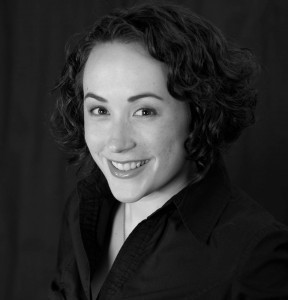
Jessie Clever
Thank you for welcoming me on the blog today to celebrate the release of the latest installment in my Spy Series, Inevitably a Duchess: A Spy Series Novella.
Blurb for Inevitably a Duchess:
It’s November 1792, and England is gripped in a maelstrom of radical speak. With revolutions in America and France, the political scene is ripe for an explosion. Richard Black, the Duke of Lofton, spy for the War Office, is assigned to follow a body snatching ring of ressurectionists for revolutionist intentions. But although he may be the spy, it’s his lover, Lady Jane Haven, who unravels the most important part of the mystery. While she may be good at spying, her curious ways put both of them in danger. Will Jane find the strength to save them both and inevitably be Richard’s duchess?
Excerpt:
The carriage stopped in front of the theater, and Richard heard the tiger jump from his perch. He moved to open the door, handing Jane down to the waiting servant.
A steady stream of elegantly dressed ladies and fashionably coifed gentleman already moved into the theater, and it was then that Richard realized he had not asked Jane what they were seeing. He gripped Jane’s hand in his as they made their way toward the entrance.
“My lady, it appears I have forgotten what it is that we are to see this evening,” he said, squeezing Jane’s hand in his.
He looked over to her in time to see the small smile on her lips.
“That is because I did not tell you what it was we are seeing,” she replied, and he thought for an instant, she was fighting a laugh.
He felt a prickle of awareness run up the back of his neck. He wanted to reach up and swat it away as if it were a physical thing.
“It is not-“
“It is actually,” Jane said, turning her face up to him in a broad smile.
He let her hand slip from his in a move of utter defeat.
“Again? Isn’t there another opera they would care to perform this season?”
Jane smiled radiantly up at him.
“You know as well as I that Monsieur Devereaux’s portrayal of Tamino is all the rage this season, and it is only fashionable that we should attend another performance.”
“We’ve already attended two,” Richard said, trying not at all to hide his exasperation.
Jane only smiled.
“Perhaps one day you will better handle your social responsibilities.”
“If anyone had told me regular opera attendance would be demanded of a duke, I would have passed on the title long ago,” he grumbled, moving to take her hand in his once more as they moved with the stream of people.
“And I would ask that you not fall asleep this time,” Jane murmured quietly.
He looked down at her blinking.
“I did not fall asleep-“
“You snored,” she whispered, “And it drew the attention of nearly everyone in the theater.”
Richard straightened and looked at the ladies and gentlemen moving in front of him.
“Well, then perhaps people found me more entertaining than Devereaux’s Tamino.”
“Perhaps,” was all Jane said as they entered the theater.
Available for purchase at:
Amazon: http://amzn.to/1hcbOu7
Smashwords: http://bit.ly/1a1Tu0l
All Romance eBooks: http://bit.ly/HE1MkW
Kobo: http://bit.ly/1a2OAQA
Barnes & Noble: http://bit.ly/1cGPnXV
About the author:
In the second grade, Jessie began a story about a duck and a lost ring. Two harrowing pages of wide ruled notebook paper later, the ring was found. And Jessie has been writing ever since.
Armed with the firm belief that women in the Regency era could be truly awesome heroines, Jessie began telling their stories in her Spy Series, a thrilling ride in historical espionage that showcases human faults and triumphs and most importantly, love.
Jessie makes her home in the great state of New Hampshire where she lives with her husband and a very opinionated Basset Hound. For more, visit jessieclever.com.
November 4, 2013
John O’Groats
By Brenda B Taylor
“They wandered from nation to nation, from one kingdom to another.” (Psalm 105:13 NLT)
The northern most district on the mainland of Scotland is the district of Caithness. Over a thousand years ago, Vikings from Scandinavia traversed the Pentland Firth and turned Caithness life upside down. For the next four hundred years, their culture grafted onto the landscape and language. Signs of their language remain in names like, Skirza and Freswick.
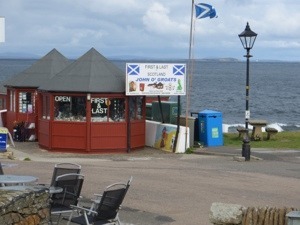
Gift Shop at John O’Groats
John O’ Groats (Taigh Iain Ghròt in Scottish Gaelic) is a village on the northeastern tip of the Highland Council area of Caithness in the Scottish Highlands. It is often called “The start of Great Britain”.
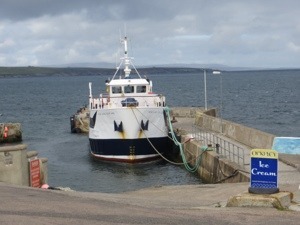
Fishing Boat
Note the ice cream sign on the dock. I’m not sure anyone buys ice cream in the cold, windy village. A cup of hot coffee or chocolate seems more desirable.
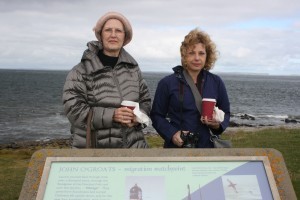
Kathy Morrow and Brenda Taylor at John O’Groats
John O’ Groats is popular with tourists because it is generally regarded as the most northerly settlement on the island of Great Britain, although this is not a claim made by its inhabitants and is in fact false. It is however, one end of the longest distance between two inhabited points on the island of Great Britain, with Land’s End on the far southern end of Great Britain, being the other point. John o’ Groats is 876 miles (1409.78 km) away from Land’s End.
The most northerly point on the island of Great Britain is nearby Dunnet Head.
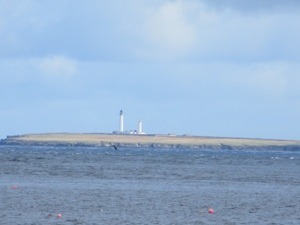
Dunnet Head Lighthouse
Brave pilots rushed out from these shores to help passing ships, less than a hundred years ago. They often became immigrants to foreign lands, because captains didn’t want to stop.
The town is said to be named after John de Groat and his two brothers, who came from Holland with a royal letter of protection and built a house on the site in the 16th century. We visited the site the first of September, and it was cold and windy. Winter time is especially fierce and cold.
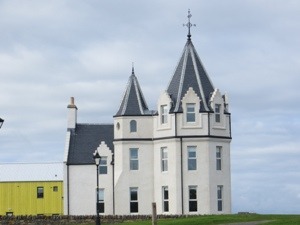
The Groats Hotel
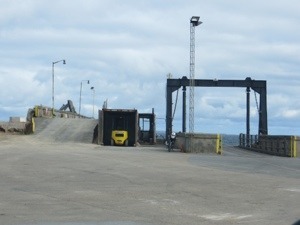
Ferry Landing
Caithness is sparsely populated and consists mainly of sheep farms. The main town in the district is Thurso, a fishing port on the northern coast of Scotland with a population of 7,300 (est. 2009).
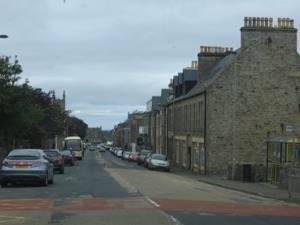
Thurso
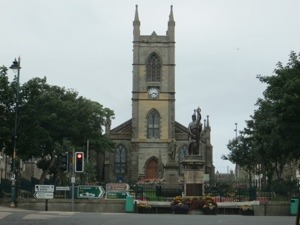
A Kirk in Thurso
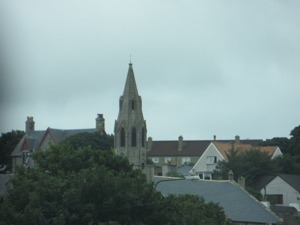
A Kirk’s Steeple in Thurso
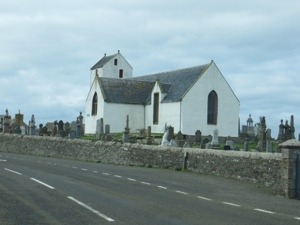
Kirk where the Queen Mother worshiped when staying at the Castle of Mey.
Castle of Mey, the vacation home of Queen Elizabeth the Queen Mother on Caithness, is located not far from John O’Groats. She worshiped in a small kirk while staying in the area.
June 29, 2013
Beauly Priory, Scotland
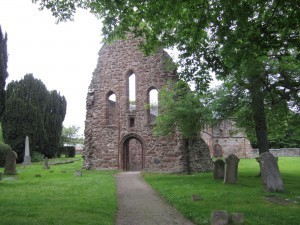
The ruins of Beauly Priory
By Brenda B Taylor
“Devote yourselves to prayer with an alert mind and thankful heart.” Colossians 4:2 (NLT)
The ruins of many churches are located in Scotland. Congregations moved on to other locations, and some like the Beauly Priory, were dismantled during the Reformation of the 16th century. The ruins tell a story of the people who served and worshiped there. Memories are preserved on the grounds, in the old walls, floors, and tombs still intact.
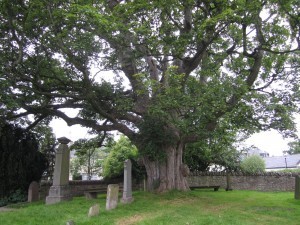
An ancient elm and cemetery on the grounds of the priory
The ruins of Beauly Priory lie at the east end of the main square in Beauly, Inverness-shire, Scotland. The reclusive Valliscaulian order of monks from the Burgundy region of France founded the priory in the years following 1230. Despite vows of poverty, the impressive church betrays the wealth and power they had acquired.
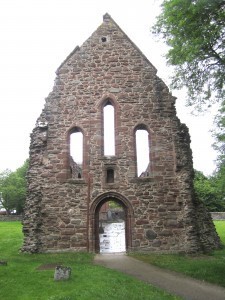
The west end of the nave
In the 1230′s the monks referred to Beauly as Prioratus de Bello Loco, which is Latin for “Priory of the Lovely Spot”. This suggests the name Beauly, from the French beau lieu or “beautiful place”, dates back further than the comment made by Mary Queen of Scots during her visit in the summer of 1564. Beauly’s monks were later supported by the Frasers of Lovat.
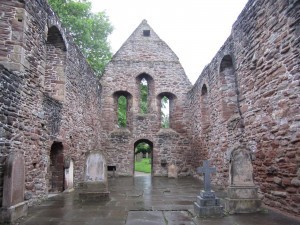
The interior looking west

Interior Looking East
The church, whose ruins still stand, was part of a complex including a cloister and accommodations for the monks.

Exterior of the priory
In about 1510 the priory changed its adherence to the Cistercian order. Substantial work on the buildings took place under Prior Robert Reid in 1541. Reid held many other offices including the Bishop of Orkney and the founding of Edinburgh University.

The Chancel
After the Reformation the priory fell into disuse, and the lead was removed from the roof in 1582. Much of the stone was used in the construction of other buildings in the town. Rumor says some of the stone was carted off for use in the citadel built in Inverness by Oliver Cromwell’s forces in 1652.
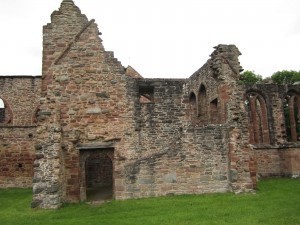
Entrance to the monks’ quarters
In 1901 architect Alexander Ross rebuilt the north transept to serve as a mausoleum for the Mackenzie family. Beauly Priory has been in the care of the state since 1913 and is now looked after by Historic Scotland.

The north transept or Mackenzie mausoleum
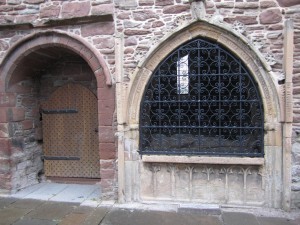
The Mackenzie Mausoleum
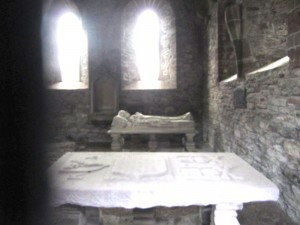
The tomb of Sir Kenneth Mackenzie, died 1491
In August of 1818, John Keats and his friend, Charles Brown, stopped at Beauly on their way to Cromarty. Their visit produced a collaborative poem, On Some Skulls in Beauley Abbey, near Inverness. The majority of the lines are by Brown with Keats contributing the first line of the poem, the first four words of the second line, and three stanzas.
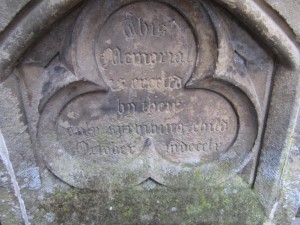
A memorial stone inside the priory
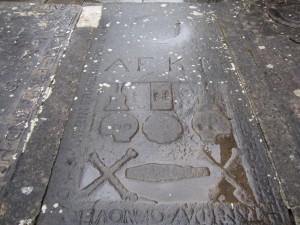
Grave markers on the floor inside the priory
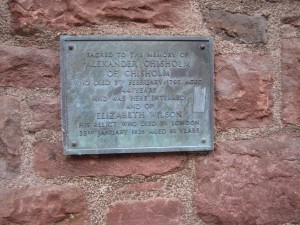
A memorial to Alexander Chisholm who died in 1793 and his wife, Elizabeth Wilson, who died in 1826

Beautiful stone works on the priory walls
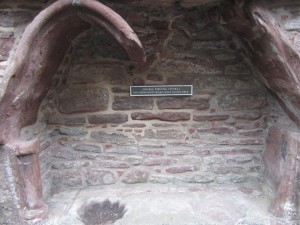
A double piscina (sinks) where the communion vessels were washed
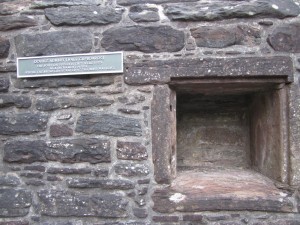
A double aumbry (wall cupboards) where the sacraments were kept
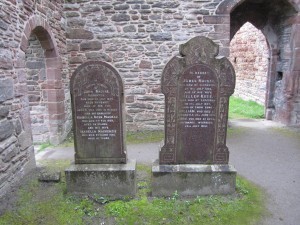
Macrae grave stones inside the priory
June 21, 2013
Heaven Must Wait
By Brenda B Taylor
Heaven Must Wait is the first book in the eBook series, The Wades of Crawford County. The historical fiction novella introduces the characters and setting of the series. Following is chapter one of the book.
“O Lord, be gracious unto us; we have waited for thee: be thou their arm every morning, our salvation also in the time of trouble.” Isaiah 33:2
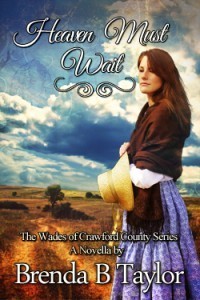
About This Book
A passionate love story about a young couple struggling to overcome the difficulties in their courtship, keep the faith, and wait for approval of their marriage. Leann Clark and Ralph Wade are in love and desire to be married, but obstacles stand in their way. Leann’s father, John Clark, insists she is too young, and Ralph cannot yet make a living farming his land in post Civil War Missouri. Times are grim after the war. Many farmers are working hard to keep their land. Leann doubts Ralph’s love when adverse circumstances prevent him from courting her as he promised.
Chapter One
Cuba, Missouri
May 1867
Their loud, harsh voices drifted to the porch. They weren’t exactly screaming at each other, but Pa didn’t sound like himself, and neither did Ralph. Leann knew both men to be headstrong in trying to get a point across. Should she go inside and stop this argument? She rose from the chair.
“Leave them alone, Leann.” Ma’s rocking chair creaked out a steady rhythm. “They’ll cool off in a minute. Your father and Ralph are both stubborn, but reasonable men.”
Leann stood beside a post on the front porch of the Clark home, gazing across the meadow. The summer sun began to slip behind the horizon, painting colors of pink and purple across the afternoon sky. The sound of clucking chickens came from behind the house in the chicken coop. The family dog turned around in the dust of the front yard until he made a bed then began licking a paw.
“I’m afraid for Ralph. Pa might forbid him to come around here.” Leann twisted the fabric of her cotton skirt.
“Sit down.” Her mother tugged on Leann’s sleeve. “Leave them be. The girls will be in from gathering the eggs in a few minutes, and your Pa won’t raise his voice around them.”
Leann sat down just as the front door opened and Ralph rushed out on the porch. He grabbed her by the hand, pulling her from the chair.
“We need to talk.” He nodded at Ma while speaking through clenched teeth. “Excuse us, Mrs. Clark, but I need to talk to Leann.”
Ralph led Leann along until they reached the large oak tree not far from the house where his horse stood tied. She heard the front door slam, again, and knew Pa came outside to join Ma on the porch.
Ralph turned to Leann, his face dark with a scowl. “He said, no. You’re too young, and I can’t provide for you good enough. We have to wait until you’re eighteen. It don’t matter your ma and mine were your age when they married. He’s expecting us to wait.”
Leann put her hand on Ralph’s arm and looked into his deep brown eyes. The unruly lock of brown hair escaped his hat and fell across his creased forehead. How could she comfort him with her own heart so heavy?
Tears filled Leann’s eyes. “I’m sorry. I wish he would change his mind, but I know he won’t.”
“Your pa’s a stubborn man.” Ralph looked toward the house where her parents sat on the porch talking in low tones, then bent down and kissed her lips with his hands clutching her arms. “He didn’t say I had to stay away from you.” His warm breath fanned across her face.
***
Leann wanted to stay in Ralph’s arms, but he turned and untied his horse.
With the reins in one hand, he gave her another kiss. “Nobody can keep us apart.” He mounted the horse.
“When will you be back?”
“Don’t know. I have the winter wheat crop to harvest and spring planting’s coming on.” He flicked the reins, turned his horse and rode away.
Leann took a handkerchief from her skirt pocket and wiped her eyes. She would miss him terribly. She stood under the tree, watching her parents on the front porch. Pa reached over and patted Ma’s hand. Leann wouldn’t go back to the house until they went inside. She didn’t trust herself to speak to either one.
Leann’s three sisters came out on the porch. They had finished gathering the eggs. Her brothers would join the family shortly after they finished with the chores. Usually on mild nights, the family laughed and talked and listened to Pa’s stories on the front porch until bedtime. Tonight, she wouldn’t join them.
“Leann, you might as well come on in here,” Pa called to her. “Your pouting won’t make me change my mind. I want to talk to you.”
Leann twisted her skirt until knots formed in the fabric and turned to look in the direction of Ralph’s retreat. If only he would come back to take her away with him. They could elope. The next time he came calling, if he did again, she would tell him to run away with her. She loved him and wanted to be with him. She couldn’t bear her life if he never came back.
A small breeze blew through the tree, rustling the green leaves. The gentle wind brushed across her face, cooling her hot skin. The heady smell of Ralph’s horse lingered around the tree. Someone caught her arm and jerked her around.
Pa stared at Leann with flames of fury burning deep in his eyes. “I told you to come on to the house. I want to talk to you.”
She had very seldom seen him angry, especially with her, so she looked down at the ground to escape his gaze. Large fingers held her arm in a firm grasp.
Pa caught her under the chin, pulling her face up. “Look at me.” Their eyes met. “Just a few days ago I explained to you about why I wouldn’t let you marry Ralph. You’re too young, and he can’t take care of you. The war put everybody here in a bind. Some folk can’t even feed their families. He just started farming on his own land, and he sure don’t have any cash saved for hard times. In a couple of years, things will be better all around.”
Leann didn’t answer. Pa was right, but she didn’t want to wait to marry Ralph. He took her breath away when he kissed her. And when his hands discovered places they shouldn’t, desire for him swept through her body down to her toes. They couldn’t wait a year and a half to get married. Waiting was getting too hard.
“I told Ralph you two need some time apart. You’re too serious, and your relationship is getting out of hand.” He released her chin but kept a firm hold on her arm.
“You told him to stay away?” Leann cried, trying to jerk free of her father’s grip. “How could you do that? You know how much I love Ralph. I want to be his wife.”
“That’s the problem. I know how much you think you love him, and I know how much he desires you. If he really loves you, he’ll wait like I asked him to.”
Leann jerked her arm. Her father released her. She ran from Pa toward the house, rushed up the porch steps and into the house, ignoring the rest of her family. The screen door slammed shut. Taking two steps at a time, she climbed the stairs to the bedroom she shared with her sisters, flung herself across the bed and cried, fearing her heart might break in a thousand pieces.
***
Ralph gritted his teeth and clutched the reins with white knuckles as the town of Cuba came into view. He eased up and let his horse canter. He had pushed Maude too hard and needed to slow down. Leann’s father made him so mad, he could spit nails. The man had nerve to question Ralph’s ability to make a living for a wife on his farm. Sure, he’d only been farming on his own for a couple of years since the war ended, but he knew how to grow and harvest crops. He had farmed with his pa and brothers on his parents’ land all his life. He loved planting seed and watching it grow into crops ready for harvest. The pungent smell of newly plowed ground and the feel of soft rich, soil between his fingers filled him with contentment and joy. Farming was dirty, hard work, but it was in his blood. His heart belonged to Leann and the land.
Waiting a year and a half until Leann reached eighteen to marry would be torture. He wanted her in his arms for more than a kiss. Every time they embraced, her warm, soft body drove him mad with want of her. For the sake of his sanity, he’d have to keep a good distance—if he had the will power. He turned Maude in the direction of Cuba. His farm lay five miles farther, but going home didn’t appeal to him. He didn’t partake of hard liquor often, but right now he needed a stiff drink or two. Maybe his good friend, Mac Henry, would be free to have a drink with him at the saloon.
Ralph trotted Maude down Main Street in the direction of Mac’s home. His friend lived with his parents and served as a deputy for his father, Paul Henry, who was the town’s sheriff. Eyeing the sheriff’s office, Ralph noticed lights still burning in the windows, so he decided to look for Mac there first. Ralph stopped in front of the sheriff’s office.
Mac walked through the front door before Ralph dismounted. “What brings you to town?” Mac asked as he walked to the edge of the porch leaning against the sun-blanched post.
“Thought I’d have a drink and get something to eat at the saloon. You want to come along?”
“Yeah, I’ll go with you for one drink and a steak. Let me tell Pa.” Mac turned and went inside, pushing the door against the inside wall.
Ralph dismounted, tying Maude’s reins to the hitching post in front of the sheriff’s office. He didn’t want the town gossips to see his horse at the saloon and tell Leann or her family. Mac joined him and the men walked down the plank footway toward the Golden Goose Saloon. A wagon passed on the dusty street, stirring up the dirt. Ralph wiped at his eye when a piece of the grit flew into it.
Just as the friends started to cross the street, a female voice called, “Ralph, Mac. Wait.”
They turned in the direction of the voice to discover Ginger Farris, Leann’s friend, hurrying toward them.
“Oh, no,” Ralph said to Mac under his breath.
“Now, be nice, man,” Mac answered, then tipped his hat.
Ralph removed his. “Ginger, how are you this fine day?”
With her head ducked and a seductive smile, Ginger stopped in front of them. “Hello, Ralph and Mac.” She glanced across the street in the direction of the Golden Goose. “Are you going to the saloon?”
The two men looked at each other. Neither wanted to admit they were going to have a drink. Ralph looked at the ground and shuffled his feet. Mac spoke up, “We were going to have something to eat, maybe a steak.”
“Well, go right ahead. Of course, I could accompany you to a good meal at the hotel restaurant.”
Ralph looked at Mac. Mac looked at him. Mac’s eyebrows rose. Ralph spoke up, “I think I’ll go on home. I’ve got chores.”
“I’ll go with you, Ginger,” Mac said and then turned to Ralph. “Be out to see you tomorrow.”
“I wish you would come, Ralph.” Ginger turned toward him as Mac took her arm.
“Not today.” Ralph put his hat on and untied Maude from the hitching rail. He mounted the horse.
Ralph watched Mac walk away with Ginger on his arm and waited until the couple entered the hotel, then he rode Maude to the rear of the Golden Goose Saloon. He dismounted, tied the mare to a tree, and went inside through the back door. The building smelled of stale tobacco smoke, whiskey and unwashed bodies. Looking around for a friend or acquaintance and seeing none, he stomped to the bar and ordered a shot of whiskey.
The bartender gave him an eye then filled his glass with the amber libation. “Haven’t seen you in here for awhile,” he said as Ralph tipped the shot glass to his lips.
The whiskey burned going down. He hadn’t had a drink of alcohol in long time, but intended to have more than one tonight. “Haven’t been in here for awhile. Pour me another one.” Ralph downed the second drink. His stomach growled. Maybe he should eat something first. He found an empty table.
One of the saloon girls sashayed to his table. She asked if she could join him, and to be polite, he said she could. The waiter came to the table. Ralph ordered a bowl of stew instead of steak and another shot of whiskey for himself. He asked the lady, who’d said her name was Pearl, if she wanted a bowl of stew. She replied she only want a drink, so he ordered a whiskey for her.
She smiled, showing white teeth between bright red lips. Hazel eyes with flecks of gold watched him from under long, dark lashes. Her skin had the look of sugar and cream. Long golden hair lay in ringlets around her bare shoulders and across the exposed tops of her creamy white breasts. A large pearl hanging from a gold chain rested in the cleavage. The tight-fitting, blue velvet gown she wore left little to the imagination. Ralph could only stare. He couldn’t help noticing the woman’s unusual beauty.
An image of Leann’s pretty, innocent face suddenly formed in his mind. What was he thinking, anyway? He couldn’t be unfaithful to Leann, no matter how attractive the woman. He quickly looked away and was glad when the waiter brought his food.
Pearl didn’t say much. He felt her eyes quietly watching while he ate the stew and drank the whiskey. She finished her drink. Ralph motioned for the waiter, gave him the order for two more whiskeys, and paid for the drinks and food.
Pearl said, “I haven’t seen you in the saloon before. Are you new in town?”
Her eyes followed as he took money from his pocket to pay the waiter. “No. I’ve lived in Cuba all my life. It’s been awhile since I’ve been in here.”
“I just recently moved here. I heard in St. Louis this town is growing, so I came to see for myself.”
“Do you like Cuba?”
“Yes.” She smiled over the rim of her glass. “I think I like it even better now.”
Returning her smile, Ralph finished eating and pushed the bowl away. What did you say to a woman like her? His head began to swim. Heat surged through his body. Sweat broke out on his forehead. The room must be getting hotter.
Pearl rose from her chair and walked around the table, stood beside Ralph, removed his hat and placed it on the table, then ran her fingers through his hair. She smelled sweet like roses.
“Would you like to come with me?” Her voice purred when she spoke. “To my room.”
Ralph swallowed hard. Before he could answer, someone grabbed the woman by her arm and pulled her away. She twisted, trying to break free.
“Get over here. You know better than to mess around with someone else.” The man’s gruff voice had a mean edge.
The large man pulled Pearl toward another table. She tried, again, to break loose. He slapped her across the face. Anger rose in Ralph like heat rising in an oven. He bolted from his chair, turning it over, and grabbed the man by the arm holding Pearl. Ralph jerked the arm, making the hand release her. The man turned, doubled his fist and hit Ralph in the face before he saw it coming.
Ralph fell backward, landing on the foul floor. The pungent taste of blood from a cut on his lip filled his mouth. Furious, he sat up and started to stand with fists clenched, ready to strike. A boot connected with his stomach, pushing him back to the floor, pinning him down. He pushed at the boot, trying to twist the leg and get it off.
“That’s enough, Wesley. Leave the woman alone.” Mac’s voice came from above Ralph. The big foot belonged to his friend.
Ralph lay back on the floor and waited with a head that felt like a watermelon about to break open. He couldn’t see Wesley or Pearl but heard them move away. Mac reached down and helped him up. Ralph saw Wesley at the bar glaring at him, but he still couldn’t see Pearl. She must have run from the room. Ralph jerked his arm free of Mac’s grasp and headed for Wesley. He intended to plant a fist right on top of the man’s big fat nose. Mac grabbed him around the waist from behind, pulling him back.
“Whoa, big fellow. You’re staying right here.” Mac held tighter. “Get your hat and come with me.”
Ralph’s head pounded. It hurt too much to fight. He grabbed his hat from the table and followed Mac outside.
Mac turned to him, “What were you thinking? Going in there and getting drunk, then making a pass at a whore?”
“I didn’t make a pass at her. She made one at me. I only had a couple, or maybe three drinks. I don’t remember.”
“You haven’t had a drink in awhile. It didn’t take much to get you going. You need to go on home and tend to your chores before you get into more trouble. What happened? You have a fight with Leann?”
“No, with her old man.” Ralph passed a hand through his hair then twisted his hat around on the band.
“Oh, I see. He said for you to lay low for awhile and give Leann a break. I told you John wouldn’t like Leann getting so serious right now. And he sure wouldn’t like you pressuring her to get married, or whatever. He’s pretty strict on his kids and watches those four girls.” Mac grinned at him. “He can spot a wolf in sheep’s clothing sniffing around his daughters.”
“I’m not a wolf.” Ralph pulled a handkerchief from his pocket to wipe the blood off his lip.
“Yep, you sure don’t look like one right now.” Mac laughed. He nodded in the direction of the sheriff’s office. “You want to come over to the office and wash up?”
Ralph glanced across the street to see Ginger standing on the porch of the sheriff’s office waiting for Mac. She watched the two men. “Nah, I’m going home.”
“She has a thing for you, you know.” His friend motioned his head toward Ginger.
“Yeah, but I’m trying to keep my distance. I don’t want Leann to know how fickle her best friend is.”
“She’s waiting to move right in, if anything happens between you and Leann so be careful. You’ve already given her gossip fodder with this saloon thing. Better stay out of town for awhile. Away from the Golden Goose and Pearl.”
“You can count on that.” Ralph shoved the bloody handkerchief into his denim pants pocket and extended his hand to Mac. “Thanks for saving me in there. I was about to jump on that Wesley fellow.”
“Then you would’ve ended up in Pa’s jail. And what would John Clark think about that?” Mac clasped Ralph’s hand in a strong handshake. “Wesley’s new in town. He’s a logger with a gang hanging around him all the time. He’ll be after you for making eyes at Pearl.”
“See you tomorrow.” Ralph left his friend to walk to the rear of the saloon, mount Maude, and ride out of town. He felt sure Leann and her family would know about the incident before he could get home.
***
Leave a comment and email address to be placed in a drawing for a free copy of, Heaven Must Wait.
May 20, 2013
The Kingdom of God

Lighthouse at Cromarty, Scotland
For the Kingdom of God is not a matter of what we eat or drink, but of living a life of goodness and peace and joy in the Holy Spirit. Romans 14:17 (NLT)
A life lived in the Kingdom of God has three defining characteristics. First it is a life of goodness. Goodness is the quality of being good. In particular, goodness is virtue or moral excellence. A life of goodness flows from God through the power of the Holy Spirit. Without the Lord, you cannot live a life of goodness.
The second virtue of the Kingdom of God is peace. Jesus told His followers, “I am leaving you with a gift—peace of mind and heart. And the peace I give is a gift the world cannot give. So don’t be troubled or afraid.” John 14:27 (NLT) Jesus is the Prince of Peace. You cannot have peace of mind and heart without knowing Him.
The third characteristic of the Kingdom of God is joy. Joy is different from happiness. Happiness is the product of outside circumstances. Joy is the product of the Holy Spirit living within you. To experience joy, you must stay focused on Jesus. He must be the largest, most important person, thing or issue in your life. Draw near to God and He will draw near to you.
Put your foot down and make a decision to be a joyful person. A joyful person is content in the circumstances of life. The Apostle Paul said he learned to be content in all circumstances (Philippians 4:11). Contentment is a choice and is learned; therefore, practice being content.
Receive God’s love to be full of joy. The Lord offers His love freely. He gave His only Son for you, and there is no greater love. People who experience depression feel unloved and unwanted. Trust in the Lord and His love for while you were living in the darkness of sin, He loved you and Christ died for you. (Romans 5:8)
Draw near to Jesus and become a person of joy.
Leave a reply and your email address to enter a drawing for a free download of the eBook, Heaven Must Wait.
April 14, 2013
The Foulis Castle Kitchen Museum
“Your faithfulness extends to every generation, as enduring as the earth you created.” Psalms 119:90 (NLT)
Foulis Castle stands in the parish of Kiltearn, Ross and Cromarty, four miles northeast of Dingwall on the old road to Evanton in the Scottish Highlands. The castle has been the seat of Clan Munro since the 11th century. The clan chief was given the castle and Foulis lands as a reward from the Earl of Ross for defeating Viking invaders.
The Munros have turned the old kitchen of Foulis Castle into a museum of artifacts used in the castle. The original keep was burned in 1746 during the Jacobite Uprising. Sir Harry Munro (c.1720-1781) built the present dwelling on the old foundations. Alterations and renovations have been made through the years, but the building remains essentially the same.
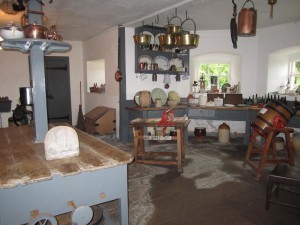
A View of the Old Kitchen
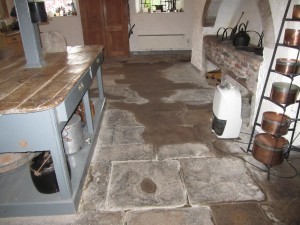
The Flagstone Floor
The kitchen is located below the main floor of the house so moisture collects on the flagstone. A dehumidifier is used to help with the dampness.
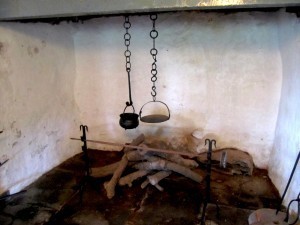
The Fireplace That Was Used for Cooking
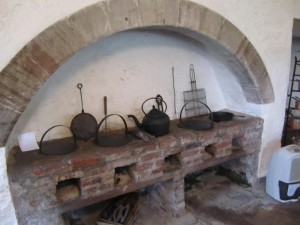
Peat Burning Stove
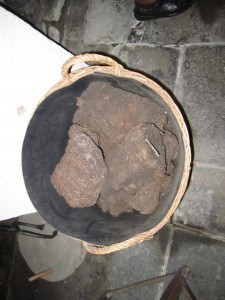
Peat for the Stove
Peat is a brown, soil-like material characteristic of boggy, acid ground, consisting of partly decomposed vegetable matter. It is widely cut and dried for use in gardening and as fuel. The Scots used peat almost exclusively as fuel until recent times when other types of fuel became available.
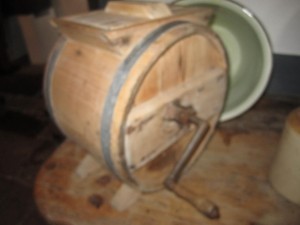
Butter Churn
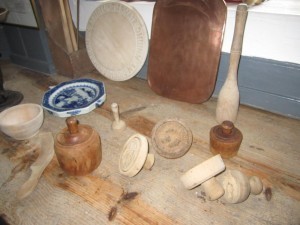
Butter Molds
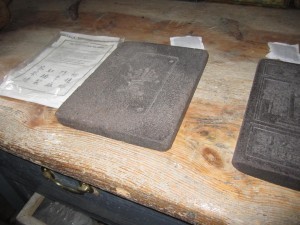
Blocks of Tea
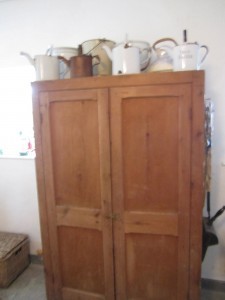
Cupboard and Teapots
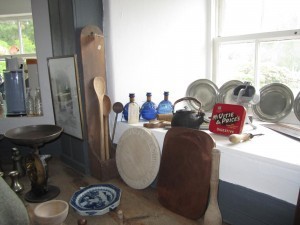
Blue Bottle Fire Extinguishers
The blue water bottles in the photograph were used as fire extinguishers. When this kitchen was used by the family, water was drawn from wells and not readily available to extinguish kitchen fires.
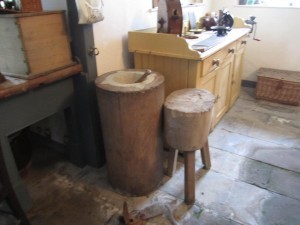
Cutting Block and Stone Flour Grinder with Pestle
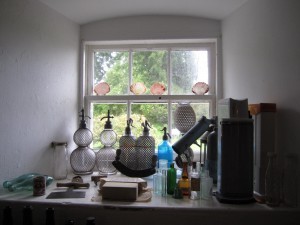
Glass Decanters and Bottles
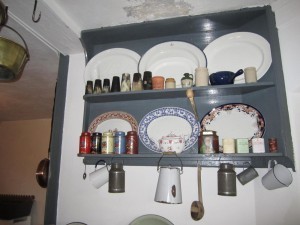
Plates and Spice Holders
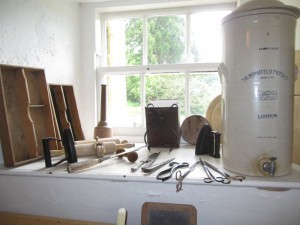
Water Jug and Flat Irons
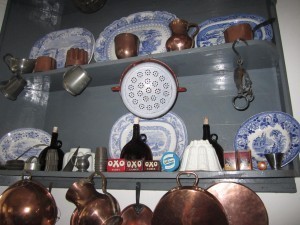
Serving Dishes and Copper Pots
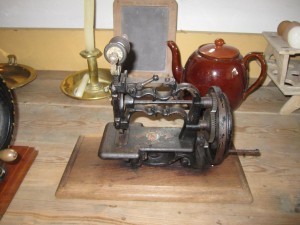
Sewing Machine
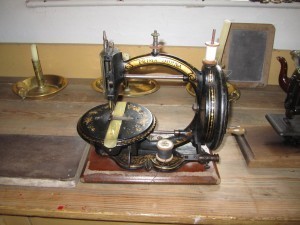
Sewing Machine
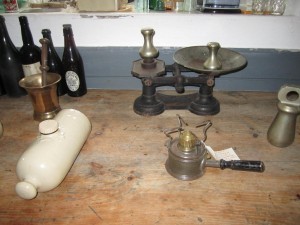
Scales and Old Bottles
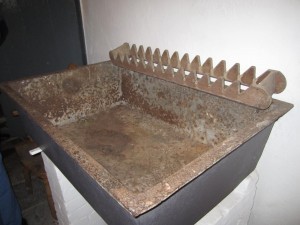
Clothes Washing Sink
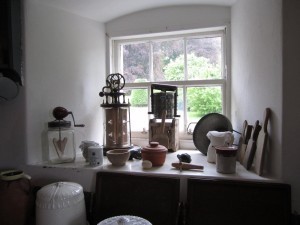
Kitchen Implements
February 26, 2013
Interior of Foulis Castle
“It is a rich land flowing with milk and honey.” Number 14:8
Following is a virtual tour of the interior of Foulis Castle located in Ross and Cromarty, Scotland. Mrs. Munro, mother of the clan chief, took us through the section that houses articles on display. She lives in the castle along with other members of the family and is a very pleasant lady. We enjoyed meeting her.
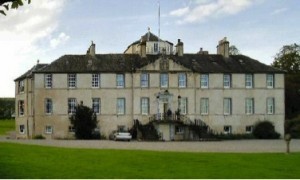
Front View of Foulis Castle
Sir Harry Munro (c.1720 – 12 June 1781) began building the present mansion after returning from the 1745 Jacobite Rising to find his ancient home destroyed by fire. He lost both his father, Colonel Sir Robert Munro, and uncle, Dr. Duncan Munro, at the Battle of Falkirk during the uprising.
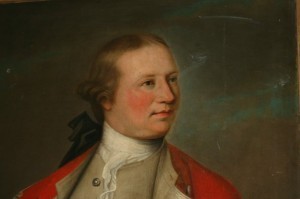
Sir Harry Munro
Sir Harry rebuilt Foulis Castle to reflect his status as 7th Baronet, 25th Baron, 28th chief of Clan Munro, and member of parliament.
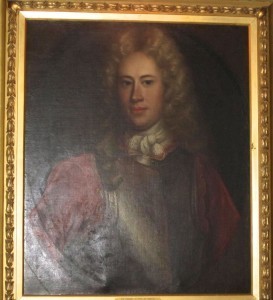
Colonel Sir Robert Munro
Colonel Sir Robert Munro 6th Baronet, 24th Baron, and 27th chief of Clan Munro (24 August 1684 – 17 January 1745). Sir Robert was a soldier-politician whose life followed an 18th century pattern. He served as a member of the Parliament of Great Britain and was killed at the Battle of Falkirk during the Jacobite Uprising of 1745.
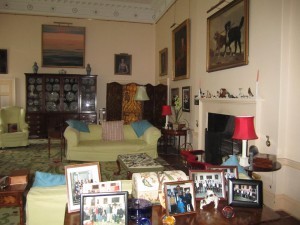
Family Photos
The Great Room of Foulis Castle with family photographs on display. Mrs. Munro was a friend of the Queen Mother who posed for a photo with the Munro family.
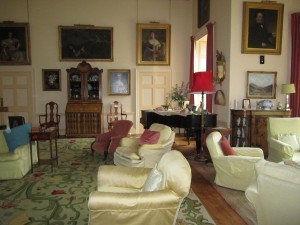
The Great Room
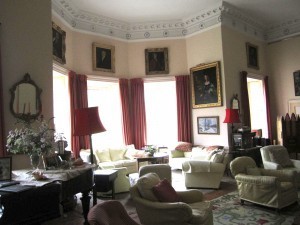
The Great Room
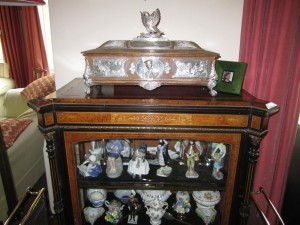
Collectibles
Munro family collectibles are on display in the great room. The above box is inlaid with silver with a silver Munro eagle adorning the lid.
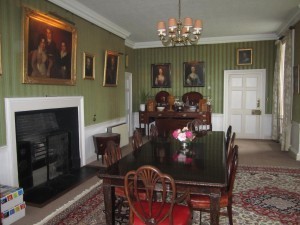
The Formal Dining Room
The walls of the great room and dining room are lined with portraits of the Munro family past and present.
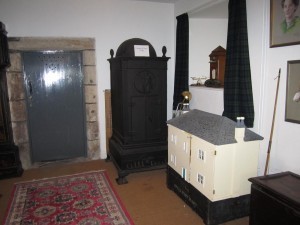
Doll House and Old Furnace
The old furnace and a doll house were on display in the basement which has been turned into a museum. The ancient kitchen is located in the basement and is also a museum. Another post will be dedicated to the kitchen museum.
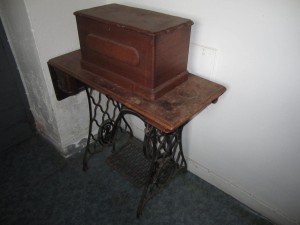
Antique Sewing Machine
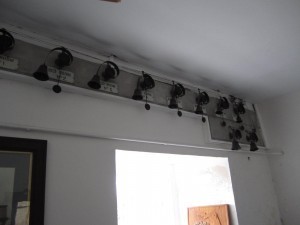
Servant Bells
The bells were linked from the family’s rooms to the servant quarters in the basement and were used to summon the servants.
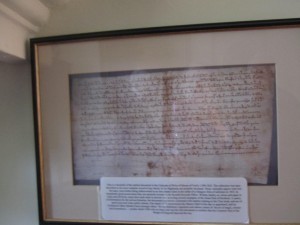
Copy of the Munro Charter
The original charter of the Munro lands is held in Edinburgh where ancient documents are stored under controlled conditions.
Traditionally the Munros came from Ireland and settled in Scotland in the 11th century under chief Donald Munro, son of O’Cathian or O’Kain, an Irish chief. Donald Munro was granted lands for services rendered to Malcolm II of Scotland in defeating the Danes (Vikings). From this Donald Munro the clan lands have since been known as Ferindonald (Fearan Domhnuill), meaning Donald’s lands.
Tradition claims Donald Munro’s grandson, Hugh Munro, was the first Munro recorded to be authentically designated Baron of Foulis. He died in 1126. A reliable scholar, Alexander Nisbet, stated that George Munro, 5th Baron of Foulis, received a charter from the Earl of Sutherland during the reign of Alexander II of Scotland, but this charter cannot be traced.
The story is told that the Munros held their land as vassals of the earls of Ross, and the payment was to present a snowball to the earl every midsummer’s day. Finding snow in summer would not be difficult since Ben Wyvis, the tallest peak on Munro lands, retains snow in its northern corries all year round.
Queen Elizabeth II is a descendent of these earls of Ross and could still claim the snowball if she wished.
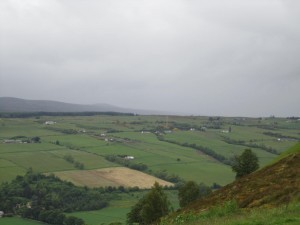
The Fertile Lands of Ferindonald
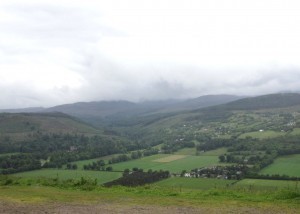
Looking Toward Ben Wyvis
The photo shows the Highlands where Ben Wyvis is located, but the peak is hidden behind clouds that cover the Scottish Highlands skies on many days.
The next post will explore the kitchen museum of Foulis Castle.

